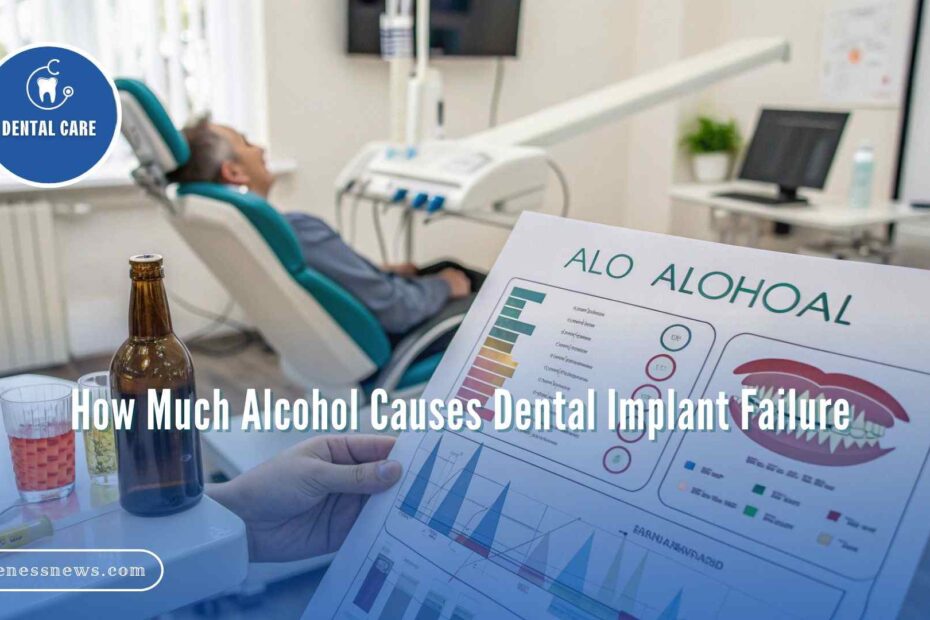Even small amounts of alcohol during the first few weeks after implant surgery can increase the risk of failure. Heavy or regular drinking significantly raises the chance of complications like infection and bone loss.
Stay with us as we talk about a very important topic — How Much Alcohol Causes Dental Implant Failure? We’ll explain it in simple words so you can keep your smile safe and healthy!
What the Science Says: How Alcohol Affects Dental Implants?
Let’s start with the basics. After your dentist inserts the titanium implant post into your jawbone, your body needs time to heal and allow the bone to grow around it. This biological process is called osseointegration — and it’s the foundation of implant success.
Here’s what alcohol can do during this phase:
- Reduces vascularization (blood flow), slowing healing.
- Disrupts osteoblast activity, which is needed for bone formation.
- Weakens your immune system, increasing the risk of infection at the implant site.
- Dehydrates your mouth, reducing saliva, which is vital for oral protection.
- Raises blood sugar, particularly harmful in diabetic patients undergoing implant surgery.
A 2019 study published in Clinical Implant Dentistry and Related Research found that chronic alcohol exposure significantly impaired osseointegration in animal models. The implications for human healing are very real.
For individuals dealing with complications such as dental cavitations or needing tooth-colored fillings, these healing challenges are even more crucial to consider.
How Much Is Too Much Alcohol After Dental Implants?
The answer depends on when you’re drinking and how much. Here’s a general breakdown:
Week 1: Absolute No-No
- Zero alcohol — not even a sip.
- Alcohol at this stage can cause clot disruption, infections, and implant rejection. If you’re using dental wax for a broken tooth in the meantime, follow your dentist’s instructions closely.
Week 2 to 4: Be Extremely Cautious
- Even small amounts (1 drink) can delay healing.
- If you must, stick to half a drink, but only with your dentist’s clearance.
After 1–3 Months: Occasional Drinking in Moderation
- Moderate alcohol consumption is generally safe after osseointegration has begun.
- Still, limit to 1 drink/day for women and 2 drinks/day for men (per CDC guidelines).
Patients with diabetes, bone disorders, or who are taking antibiotics or painkillers should avoid alcohol entirely until cleared by their dentist.
Alcohol and Dental Implant Failure Rates: What the Numbers Say?

Clinical Research Findings:
- A 2021 review in the Journal of Periodontology reported that alcohol consumption was a contributing factor in up to 16% of implant failures when combined with poor oral hygiene.
- Another study from Brazil found that regular drinkers had a 3.2x higher chance of peri-implantitis, a serious condition that can lead to implant loss.
In simpler terms: alcohol can weaken the foundation of your dental implants — and just like a building, when the foundation crumbles, the whole structure fails.
If you’re considering dental grafting in Towson, be especially cautious during healing.
Alcohol vs. Other Risk Factors for Dental Implant Failure
It’s important to understand how alcohol compares with other known risks. Here’s how it stacks up:
| Risk Factor | Level of Impact | Why It Matters |
| Smoking | 🔥 Extremely High | Depletes oxygen, delays healing, increases infection |
| Alcohol | ⚠️ High (especially early on) | Interferes with bone growth, weakens immune defense |
| Poor Oral Hygiene | ⚠️ High | Increases plaque, bacteria, and risk of infection |
| Diabetes (Uncontrolled) | ⚠️ High | Slows healing and increases gum issues |
| Grinding Teeth (Bruxism) | ⚠️ Moderate | Can loosen implants over time |
If you’re smoking and drinking during recovery, your chances of implant failure skyrocket. Dentists often advise quitting both before and after surgery for the best outcomes.
Long-Term Effects of Alcohol on Dental Implants
Let’s say you made it through recovery and started drinking moderately again — is that safe?
Generally, yes, if:
- Your implant site has fully healed.
- You maintain excellent oral hygiene.
- You go for regular dental check-ups.
However, heavy or chronic alcohol use over the long term can cause:
- Peri-implantitis (inflammation of the gum and bone around the implant)
- Bone loss in the jaw
- Dry mouth, increasing the risk of decay around surrounding teeth
- Reduced bone density, especially in older adults or post-menopausal women
If alcohol use is frequent, your implant may be secure today, but you’re playing a risky long game. Considering the cost of ClearChoice dental implants, it’s wise to avoid behaviors that could compromise their longevity.
Safe Alcohol Practices Post-Dental Implant:
If you’re someone who enjoys the occasional drink, here’s how to enjoy alcohol safely after getting dental implants:
Do:
- Wait at least 7–14 days before your first drink (ask your dentist first).
- Stick to light drinks (1 glass of wine, light beer).
- Rinse your mouth with water after drinking.
- Practice excellent oral hygiene daily.
- Go for dental checkups every 6 months.
Don’t:
- Drink heavily or binge drink, even weeks later.
- Combine alcohol with painkillers or antibiotics.
- Skip brushing or flossing after consuming sugary alcohol like cocktails.
- Use alcohol-based mouthwash that may irritate healing gums..
What to Do if You’ve Already Drank Alcohol Too Soon?
If you’ve already had a drink within the first few days after surgery, don’t panic — but do the following:
- Stop drinking immediately.
- Rinse with lukewarm salt water to reduce bacteria.
- Monitor for signs of complications: swelling, bleeding, pain, or bad breath.
- Call your oral surgeon or dentist if anything feels off.
If needed, they might refer you to your dental office manager for additional care coordination or a treatment update.
FAQ’S
1. Can I use alcohol-free beer or wine after dental implant surgery?
Yes, alcohol-free alternatives are generally safe after surgery, especially in the early healing phase. However, some non-alcoholic beverages still contain small traces of alcohol or sugar, so it’s best to read labels and consult your dentist. Avoid carbonated or acidic drinks during the first week to prevent irritation at the implant site.
2. How long should I wait to drink alcohol after bone grafting for dental implants?
If you’ve had a bone graft along with your implant, you may need to wait longer than the typical 7–14 days. Most oral surgeons recommend avoiding alcohol for at least 3–4 weeks to allow the graft to stabilize and promote optimal bone growth. Alcohol can hinder the integration of graft material just like it does with implants.
3. Does red wine stain dental implants or crowns?
While titanium implants themselves don’t stain, porcelain or composite crowns attached to them can become discolored over time if frequently exposed to red wine, coffee, or smoking. If you enjoy red wine, rinse your mouth afterward and brush regularly to minimize staining.
4. Can alcohol interfere with sedation or anesthesia before implant surgery?
Absolutely. Drinking alcohol 24–48 hours before any dental surgery can increase the risk of complications during sedation or anesthesia. Alcohol can affect liver function, making it harder for your body to metabolize sedatives, which may result in unexpected reactions or extended recovery times.
5. Are certain types of alcohol worse than others for dental implant recovery?
Yes Sugary cocktails, flavored liqueurs, and dark liquors can be more damaging due to their acidity and sugar content, which promote bacterial growth and dry mouth. If you must drink after you’re cleared by your dentist, choose dry wine or light beer and always rinse your mouth with water afterward.
Conclusion:
Drinking alcohol after getting dental implants can slow healing and raise the risk of failure. But with smart choices and good timing, you can enjoy life and protect your smile. Always follow your dentist’s advice, stay healthy, and give your implants the best chance to last for years to come.
